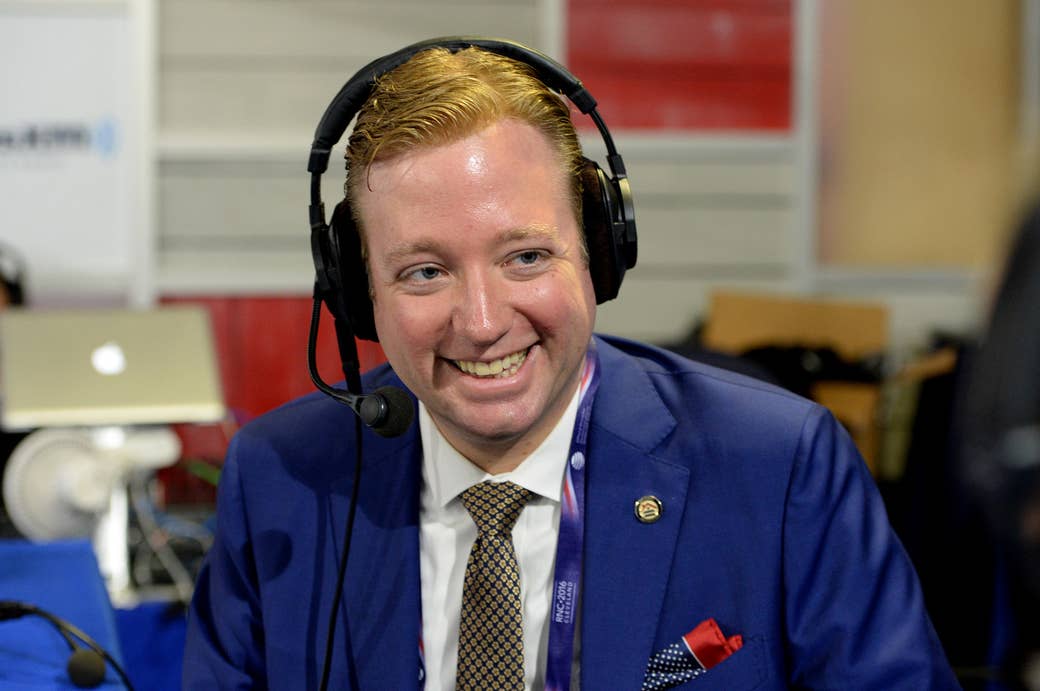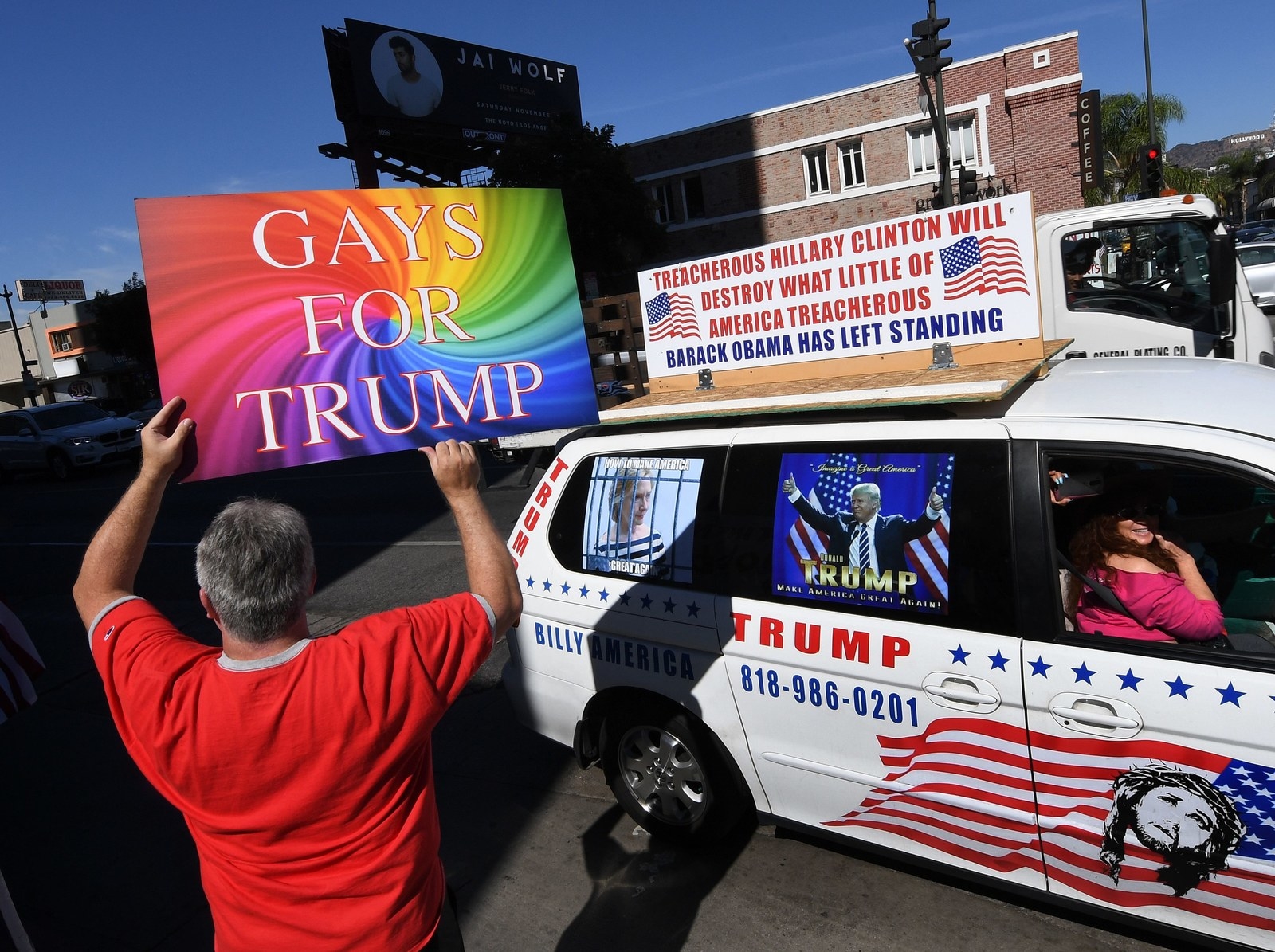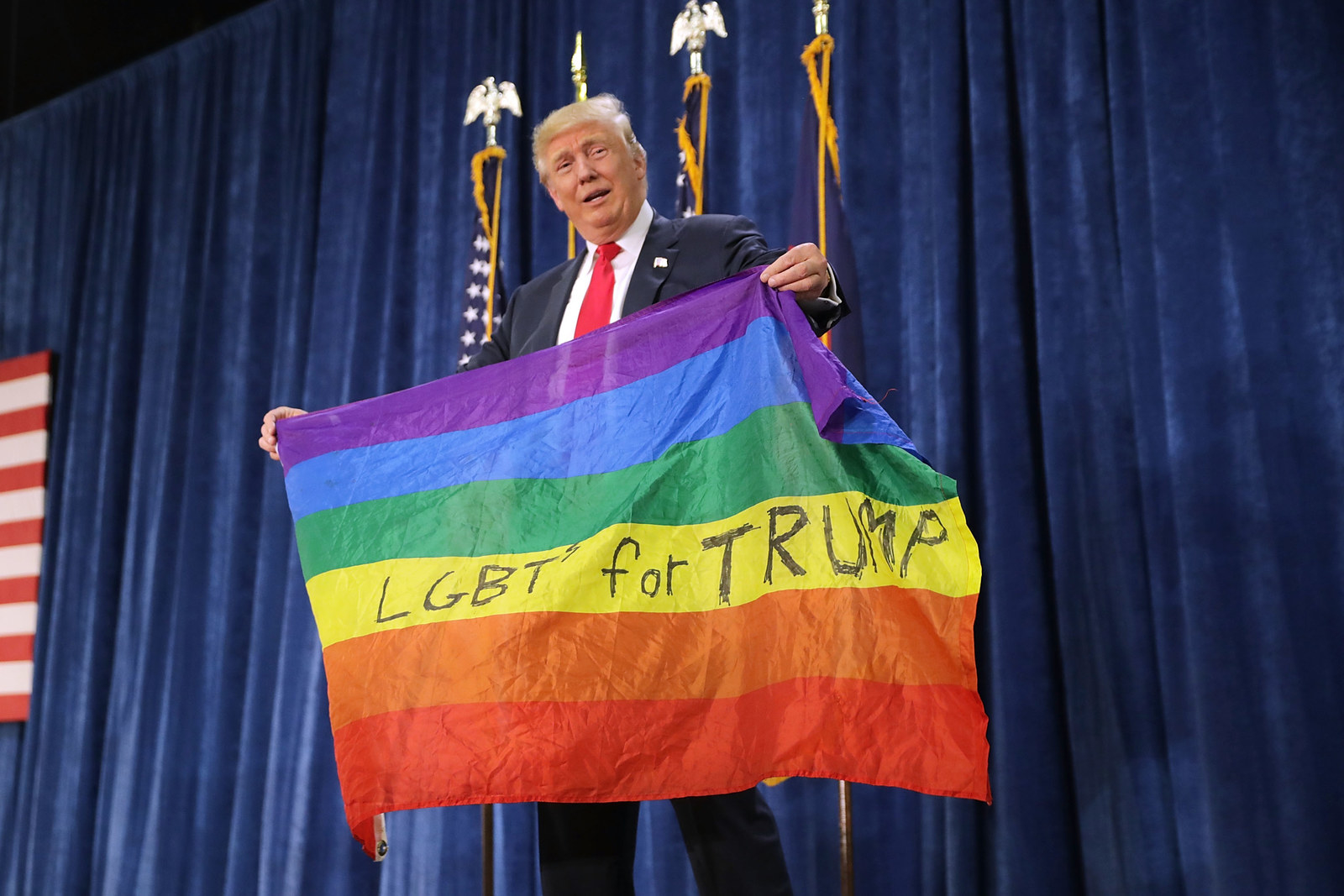
Gregory T. Angelo has been waiting for this moment. In 2008, he began volunteering for the Log Cabin Republicans, the country’s most famous conservative gay organization, and over Obama’s tenure, he climbed the ladder to become the group’s president. But he was often sidelined when better-known, more-liberal LGBT organizers ran victory laps with the White House to celebrate milestones like marriage equality (a position that Angelo’s group supported years before Obama did). And in the past year, he clenched his teeth while other LGBT organizations — and their leaders — crusaded for Hillary Clinton.
Then it became obvious just how unprepared his liberal counterparts were for Donald Trump winning, he recalled during a recent interview. A week after the election, advocates had met in California to grapple with their situation, and the second item on their agenda was figuring out how to “engage” with the transition team.
Angelo already knew how to engage with Trump’s team — their numbers were in his phone. He spoke to them several times a week. And he wasn’t the only gay activist plugged in. A few LGBT groups with roots in conservative circles, including the American Unity Fund, told BuzzFeed News they had had been talking to Trump’s staff for weeks or more. In some cases, they had been cultivating relationships for years with people who ended up working on the transition. Now, with Trump prepared to take the oath, Angelo and a handful of gay conservative activists think they have a rare, if not unprecedented, advantage over their liberal peers.
As progressives sprint to catch up — or refuse to deal with Trump’s staff directly — these gay activists on the right believe access to Trump’s White House will make them bellwethers for the entire LGBT movement.
“A lot of people tried to deny that our movement even existed.”
On Saturday their relationships will be on display when the Log Cabin Republicans hold an inauguration party at the Capitol Hill Club. Their guest of honor will be Rep. Chris Collins — the Trump transition’s congressional liaison. Angelo said his group was also invited recently to brief Trump’s staff on preserving an executive order, signed by Obama, that banned LGBT discrimination in federal contracts. Angelo submitted a white paper earlier this week.
“For decades, the push for LGBT equality in the United States was defined almost exclusively by the left,” Angelo said in his group’s Washington, DC, headquarters last month. “But LGBT leaders who represent our interests didn’t even try to form a relationship with the president-elect while he was running for office — that is astounding to me.”
Angelo is himself like a young, gay Trump, with a plume of yellow hair and an appetite for combat. His office near Capitol Hill features a framed portrait of Reagan behind his desk and a flag with a “Don’t Tread On Me” logo hanging in front of him. Like Trump, he occasionally breaks with Republican doctrine — like diverging from the party’s anti-LGBT platform — but he’s more coy. He said his middle initial stands for “Thunder” and refused to share his age. Most of all in our interviews, Angelo relished that this week, LGBT Americans will have their first Republican president who isn’t openly hostile to them.
Trump’s positions on LGBT rights have been contradictory, but his gay supporters point out Trump made several positive overtures during the campaign — even holding a pride flag on stage — giving hope he will rein in anti-LGBT people around him, like his vice president, Mike Pence. They want to persuade Trump to leave Obama’s LGBT legacy untouched and hope to work with Trump, and a Republican Congress, to cut deals Democrats would have shunned.
Upstart gay activists are invigorated, too. Among the inauguration festivities, a Gays for Trump ball will be hosted on Friday night by a group that formed on Twitter. “We have moved from a hashtag movement to a flesh-and-blood organization,” said Peter Boykin, the ringleader from North Carolina, who is expecting more than 200 people for a three-course, black-tie gala. Tickets topped out at $500, he said. “A lot of people tried to deny that our movement even existed.”
But as they try to cement inroads with the new administration, Angelo said traditional LGBT groups like the Human Rights Campaign could have little, or zero, influence. “They so demonized Trump during the 2016 presidential campaign that any advocacy they did wouldn’t have any heft to it,” Angelo said. Log Cabin Republicans didn’t endorse Trump, he noted, but they didn’t oppose him, either. “We have organizations on the LGBT left with budgets in the millions and staff in the hundreds, and they’re scrambling now because they don’t have the level of access to the Trump transition team and incoming administration that the Log Cabin Republicans have.”
But on the conservative side, American Unity Fund’s strategic adviser, Tyler Deaton, and the leader of a group called LGBT for Trump, Chris Barron, have — like LCR — been talking to Trump’s transition regularly, they told BuzzFeed News in recent interviews.
Deaton said his organization, which is backed by hedge fund manager and philanthropist Paul Singer, has been briefing Trump’s staff on legal issues pending at federal agencies. Deaton has been talking to landing teams for the Justice Department, the Education Department, Health and Human Services, the Pentagon, and more. “The fact that these conversations are happening, and [their position] isn’t just a forgone conclusion is a great sign.”
“Conservative LGBT organizations are going to be leading more and more during this administration."
This could force the public to reckon with how they think about LGBT rights in the US. “Conservative LGBT organizations are going to be leading more and more during this administration,” Deaton said at a lunch spot a few blocks from the White House, noting that red dominance in both Congress and state capitols favors couching LGBT issues in conservative terms. “This is an opportunity for the LGBT community to dig in, to look at the landscape, to see that Republicans are overwhelmingly in charge.”
Which would flip the tables. Conservative LGBT activists were always relegated to fringes of their own movement because their agenda — legalizing marriage, banning discrimination — has been anathema to their own party’s anti-LGBT platform.
(Transition officials did not comment on what type of contact they have had with conservative LGBT organizations and if the advocacy before Inauguration Day has influenced their plans.)
But as Angelo, Barron, and Deaton see it, this is their chance realign one of the country’s leading social causes. They could help conservatives back away from unpopular, hardline positions while making headway where liberals couldn’t — and cutting deals that Democrats wouldn’t.
Yet those deals, their idea of what makes good policy, would make many progressives howl. For example, they think an LGBT nondiscrimination bill in Congress must include exemptions for religious objections, so people of faith can opt out in some circumstances.
Perhaps even harder to swallow for the left, Angelo wants to make other conservative goals — like gutting the Affordable Care Act and slashing taxes — intertwined with the LGBT agenda.
“We will be making a case for things like Obamacare repeal, death-tax repeal, fighting radical Islamic terrorism in the US — issues that henceforth have rarely been viewed through the prism of the LGBT community,” said Angelo. “The strategy and the tactics that we pursue may be different,” he acknowledged, but added, “Whether folks want to believe it or not, I do have the interest of all LGBT people at heart.”

President Obama wasn’t tight with gay Republicans. The most recent White House LGBT liaison, Raffi Freedman-Gurspan, told BuzzFeed News this month she never got in touch with conservative groups like American Unity Fund or Log Cabin Republicans — even though her job was being the president’s main contact for LGBT groups.
As she explained it, the conservative gay groups never contacted her, and she never reached out to them.
“I obviously work for a Democratic administration,” she said in an interview during her last week on the job. “There are obviously appropriate conversations and inappropriate ones, sometimes based on what’s going on.” But she didn’t regret keeping a distance, she added. “I was never in a position where I needed them, to be honest … I’m not in political strategy, and if I had been, it might have been a different story.”
“I was never in a position where I needed them," said Obama's LGBT liaison.
Which is why it’s not shocking the relationship between Trump’s people and progressive LGBT groups is firming up as rather icy.
The biggest of the organizations, the Human Rights Campaign, swung for the fences for Clinton — producing videos last year about Trump’s “hate-filled campaign” and sending a membership email this week about their long-term plan to “defy Trump.”
Jay Brown, a spokesperson, said in December the group was “eager to talk with anyone on the Trump team who is willing to stand up and be a champion for equality,” but he didn’t confirm they had actually talked to anybody. Brown did say Trump is preparing to stack his cabinet the “worst enemies of equality,” adding that his group has been “working closely with progressive partners to discuss and plan strategies to block attempts to roll back our progress.”
Other mainstream LGBT groups reported varying — but limited — contact with the Trump team a month after the election. Freedom for All Americans, a nonpartisan group with ties to both parties, said through a spokesperson they had “been in touch” with Trump’s transition, but refused to elaborate. Karin Johanson, the ACLU’s national political director, said in a statement that staffers “have had informal conversations with the Trump team” and offered no more.
At the National Center for Transgender Equality, spokesperson Jay Wu said in December they had done nothing on this front: “We haven’t reached out to the transition team.”
As much as conservatives may dislike it, however, these progressive organizations cannot be ignored — they can rally thousands of activists and Democrats to try to block bills in Congress and state houses. The ACLU has vowed to be a brute in court. Plus, LGBT people as a bloc skew far to the left, with Gallup reporting three times more LGBT Democrats than Republicans.
When he spoke about the partisan divide, Angelo unspooled years of frustration at what he sees as a dead-end strategy by liberal LGBT organizations that represent those interests. They tailored advocacy to Democrats and shut out conservatives. They helped pass laws that ban discrimination in states that Democrats already control, but now they face nearly three dozen states where the LGBT movement is essentially stuck. Most state legislatures, governor’s mansions, and seats in Congress belong to Republicans. The one federal bill to ban LGBT discrimination, the Equality Act, hasn’t had a hearing in Congress since it was filed in 2015.
The only way to pass new LGBT-friendly bills, his thinking goes, is by having fellow conservatives argue the case.
Angelo said he speaks several times a week with people in Trump’s circle, including Ed McMullen, who has assisted with the transition and is vice chairman of the committee planning for Trump’s inauguration. Angelo has known other people in the transition for years, he said. They include financial pundit Larry Kudlow, who spoke at the Log Cabin Republicans annual dinner in 2014, and David Malpass, who worked in the Treasury under Reagan. Those two aren’t representing LGBT issues for the transition, he said, but he argued it underscores how Log Cabin and groups like his have built relationships.
Barron, with LGBT for Trump, said, “There is this belief somehow that Donald Trump is the antichrist for LGBT folks,” pointing out that Trump has made gestures never seen before from a Republican president-elect. Barron has been furious that liberal groups balked at nominees who have been friendly to gay causes, such Secretary of State nominee Rex Tillerson, who backed gay inclusion in the Boy Scouts as the group’s president. If the left-leaning groups don’t play ball, he said, “They become marginalized.”

There is a question many can’t help but wonder about gay conservatives: Aren’t they already marginalized? Their party largely rejected their cause.
Deaton said the premise of that thinking is flawed, countering that many conservative Republican lawmakers want — in fact, they’re “excited” — to support LGBT rights. He’s coached some of them, he said, and the first step is creating a “safe space” for them to ask questions. Many want to be taught transgender basics. “It wasn’t too long ago that we were talking about what it means to be a gay American, and now we are having that experience on what it means to be a transgender American.”
“I am kind of borrowing from the left with that ‘safe space’ jargon,” he laughed. Deaton sells this to Republicans as a conservative issue — one conservative to another. Even his language is tailored for this framing, consistently using the term “LGBT freedom” in our interview, never “LGBT rights.”
Another tactic to win Republicans: Telling stories about family and getting the government out of private lives, which are bedrock language for both conservatives and LGBT people, Barron added. “I think it’s sad we have gotten away from some of that messaging, and it has become much more of a ‘Our way or the highway’ from some folks in the community.”
But realistically, even the best messaging is a tough sell for the base: The GOP adopted a platform last summer that reads like a manifesto to extinguish LGBT rights in America, and several members of Trump’s cabinet have severe records.
To get past the sales pitch, these guys actually sell a slightly different product — a different blueprint for LGBT rights than groups like the Human Rights Campaign.
Deaton, Barron, and Angelo said bills banning discrimination must compromise by offering limited carve-outs for people with religious objections.
“There is this belief somehow that Donald Trump is the antichrist for LGBT folks."
Deaton suggested a federal model based on a Utah law, which bans LGBT discrimination at work and in housing, but includes a few exemptions. The Utah law lacks protections in places of public accommodation, so businesses can still legally turn away a couple for being gay. Religious groups are also exempt, and people would be free to express their religious beliefs about marriage in the workplace, so long as it’s not done in a harassing way.
Of course, Democrats and progressive groups would balk at a bill like Utah’s if it were attempted in Congress. Many have said they only supported the Utah law because of unusual circumstances there — the state’s preexisting civil rights law lacked public accommodations protections for other classes of people, which is why it was omitted for LGBT people.
The more immediate concern in Washington, DC, is persuading Trump to not repeal anything already on the books. Trump’s cabinet, particularly Sen. Jeff Sessions of Alabama, who’s been nominated to lead the Justice Department and has a rigidly anti-LGBT history, presents a unique threat. The primary unresolved issue of the Obama administration's LGBT agenda is its effort to interpret bans on sex discrimination so that they also include bans on discrimination against transgender people — a legal stance held by the Justice Department that influences every agency. Sessions could reverse that interpretation and, for example, reverse the government’s position on a pending Supreme Court case involving a transgender boy’s use of school restrooms in Virginia.
Deaton, who has been in talks with landing teams for federal agencies, said that how Trump and Sessions handle this matter signals how the next White House “will handle LGBT freedom generally.”
But it’s unclear if this hallmark of Obama’s progress — fighting for transgender people — is also on the radar of gay men like Angelo and Barron.
“We haven’t taken a position on that yet,” said Angelo, unfamiliar with the scope of this legal interpretation that sweeps across agencies and courts.
Angelo paused to note his group recently came around to include transgender rights within its mission. “We don’t have any transgender staff here at Log Cabin Republicans,” he said. “I rely largely on transgender chapter leaders, members, and supporters to provide guidance on those issues to me.”
Barron, for his part, said he “is not a legal expert” on the issue of using civil rights laws to cover transgender people, and seemed to suggest it could be handled on a “case-by-case basis,” despite the fact that inconsistency could create legal fractures between departments.
But if the Trump team scorches these guys on LGBT rights somehow, the question becomes, how much capacity do they have to fight back?
American Unity Fund has a multimillion dollar budget and about a dozen staffers — a fraction of the Human Rights Campaign and the ACLU. The Log Cabin Republicans’ membership is a mystery. Angelo and a spokesperson for the group said they have 30,000 supporters, but refused to answer questions about how many were actually members and about the group’s budget. Barron’s group, LGBT for Trump, is mostly him advising Trump’s staff.
“Maybe I will be be proven wrong,” Barron said about his hopes for Trump’s LGBT legacy. “But I will trust him for now rather than terrifying people into believing that Trump is going to do something that he hasn't done.”
